 Martenitsa adds glamour to Bulgarian Embassy
Martenitsa adds glamour to Bulgarian Embassy
 Mysterious 'Dolan Tribe' in Xinjiang
Mysterious 'Dolan Tribe' in Xinjiang
 This is Shanghai
This is Shanghai
 Female attendants serving 'two sessions'
Female attendants serving 'two sessions'
 The many tears of DiCaprio
The many tears of DiCaprio
 Dan Dan's bittersweet opera life
Dan Dan's bittersweet opera life
 A dream wedding for a girl suffering from cancer
A dream wedding for a girl suffering from cancer
 Old photos of Anti-Japanese War (1937-1945)
Old photos of Anti-Japanese War (1937-1945)
 This is Beijing – Nanluoguxiang
This is Beijing – Nanluoguxiang
BEIJING, March 10 -- The international community on Sunday called for a diplomatic solution to the ongoing Ukrainian and the establishment of an international contact group.
Chinese President Xi Jinping and German Chancellor Angela Merkel on Sunday discussed the Ukraine crisis in a phone conversation.
Xi said that as the current situation in Ukraine is very complicated and highly sensitive, various factors should be taken into consideration in the handling of the crisis.
He called on all parties concerned to exercise restraint and seek a political solution through dialogue and negotiations within the framework of law and order, so as to avoid further escalation of the situation.
China supports the international community's efforts and mediation, Xi said, voicing the hope that Germany would continue to communicate with other relevant parties and further play a constructive role. China is willing to keep contact with Germany on the issue, he said.
Merkel said Germany hopes for an appropriate solution through dialogue, adding that her country attaches importance to China's role and is willing to strengthen communication with China on the issue.
She also held phone talks with Russian President Vladimir Putin on Sunday and pointed out the urgency of establishing an international contact group, which will find a political way to end the conflict in Ukraine, German government spokesman Steffen Seibert said.
As Germany's partner in Europe, Britain expressed its will, along with their European and American partners, to work with Russia to find a diplomatic solution to the situation in Ukraine, including Crimea, through a phone call between British Prime Minister David Cameron and Putin.
Cameron also urged Putin to de-escalate the situation in Ukraine and to support the formation of a "contact group" that could lead to what Britain described as "direct talks between the governments of Russia and Ukraine," according to a Downing Street spokesperson.
Putin agreed that a diplomatic solution is in all their interests and he would discuss the proposals on the contact group issue with Russian Foreign Minister Sergei Lavrov on Monday.
While the world calls for diplomatic solutions to the crises, the U.S. are taking steps to impose sanctions on Russia over the latter's recent moves in Ukraine's Crimea.
Former U.S. Defense Secretary Robert Gates Sunday applauded the dispatch of additional fighter aircraft for the air patrols in the Baltic States of Lithuania, Latvia and Estonia, but he said that the additional measures will not deter Russia.
"Some of the sanctions that are being discussed and the actions being taken, whether it's limitations on visas or on travel or on potentially freezing assets of specific individuals, frankly I don't believe are going to be any deterrent for Putin," Gates told host Chris Wallace on Fox News.
The Ukrainian political crisis, which originated from public anger over ousted President Viktor Yanukovych's decision in November last year to put on hold an association agreement with the European Union in order to get the Russian aid, took an abrupt turn last month as a result of bloody clashes between protestors and police.
Ukraine's autonomous republic of Crimea became the epicenter of an ongoing tension in the East European country.
The Crimean parliament on Thursday voted to join Russia and a referendum on Crimea's status would be held on March 16.
Commenting on the simmering tensions in Crimea, Russia said last Friday that they did not expect a new cold war and the West and Moscow could seek some common ground to solve the Ukraine crisis through dialogue.
Referring to the scheduled referendum on March 16, Russia said it reflected the common will of the Crimean people.
 Chaihe village, pure and peaceful fairyland in snow
Chaihe village, pure and peaceful fairyland in snow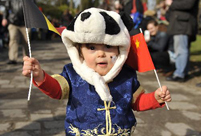 Belgians warmly welcome arrival of China's giant pandas
Belgians warmly welcome arrival of China's giant pandas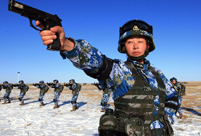 Female marines receive tactical training in NW China
Female marines receive tactical training in NW China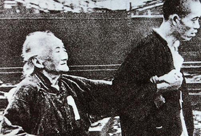 Blood memory: Nanjing Massacre in 1937
Blood memory: Nanjing Massacre in 1937 Top 10 pure beauties in showbiz
Top 10 pure beauties in showbiz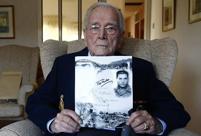 British WWII veteran: I can't forgive Japan
British WWII veteran: I can't forgive Japan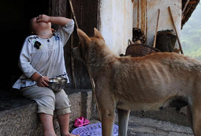 Tongban's dream of prosperity
Tongban's dream of prosperity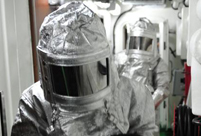 Chinese frigate Yancheng holds drills in Mediterranean Sea
Chinese frigate Yancheng holds drills in Mediterranean Sea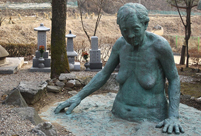 A visit to comfort woman's home in South Korea
A visit to comfort woman's home in South Korea Fairyland? Qingdao in sea of clouds
Fairyland? Qingdao in sea of clouds Top 10 most handsome faces in Asia in 2013
Top 10 most handsome faces in Asia in 2013 Female celebs with beautiful long legs
Female celebs with beautiful long legs Cat 'guardians' in Forbidden City
Cat 'guardians' in Forbidden City Large numbers of ancient coins excavated in Inner Mongolia
Large numbers of ancient coins excavated in Inner Mongolia Leisurely life beneath Zhonggulou, where time travels slower
Leisurely life beneath Zhonggulou, where time travels slowerDay|Week|Month